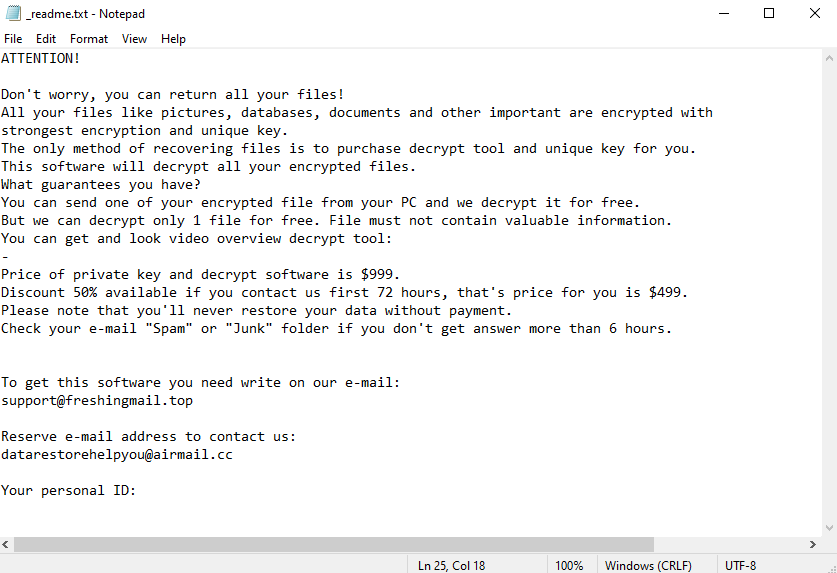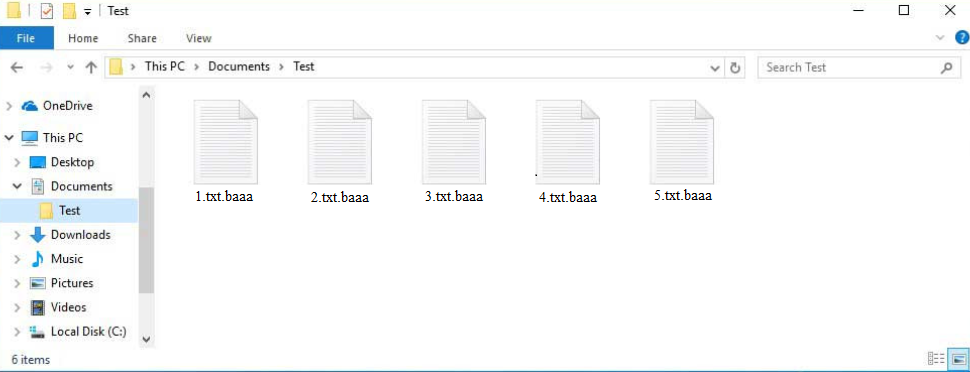How to delete Baaa ransomware
Baaa ransomware is a dangerous piece of malware that encrypts files. It belongs to the Djvu/STOP ransomware family. This version can be differentiated by the .baaa extension added to the file names of encrypted files. This ransomware is considered a dangerous infection because encrypted files are very difficult to recover. At the moment, only users who have a backup can recover files for free.
When a malicious file is opened, the ransomware initiates and starts encrypting files. Its main targets are the files users would be most willing to pay for, including photos, videos, and documents. While it’s encrypting files, the ransomware displays a fake Windows Update window, likely to distract users from what’s happening. Once encryption is done, files will be unopenable. File names will also have the .baaa extension added to them. Unfortunately, encrypted files will remain unopenable unless they are decrypted with a special decryptor. However, obtaining the decryptor is difficult.
If your computer is infected with Baaa ransomware and your files have been encrypted, you will find a _readme.txt ransom note in folders that have encrypted files. The note is a very generic one and is identical to the one dropped by most Djvu/STOP ransomware versions. According to the note, you have to pay $999 to get the decryptor that would allow you to open encrypted files. There’s also supposedly a 50% discount if you make contact with the malware operators within the first 72 hours. Cybercriminals also promise to decrypt one file for free as long as it does not contain important information.
If you don’t have a backup, paying the ransom may seem like a tempting option but we recommend against it. Paying the ransom or even engaging with cybercriminals is never recommended because it does not guarantee a Baaa ransomware decryptor. If you are considering paying the ransom, keep in mind that you are dealing with cybercriminals. They will not feel obligated to help victims, even after they pay. Unfortunately, many victims have paid money to ransomware operators but have not received anything in return. Furthermore, the money users pay goes towards future criminal activities.
Here is the full Baaa ransomware _readme.txt ransom note:
ATTENTION!
Don’t worry, you can return all your files!
All your files like pictures, databases, documents and other important are encrypted with strongest encryption and unique key.
The only method of recovering files is to purchase decrypt tool and unique key for you.
This software will decrypt all your encrypted files.
What guarantees you have?
You can send one of your encrypted file from your PC and we decrypt it for free.
But we can decrypt only 1 file for free. File must not contain valuable information.
You can get and look video overview decrypt tool:
–
Price of private key and decrypt software is $999.
Discount 50% available if you contact us first 72 hours, that’s price for you is $499.
Please note that you’ll never restore your data without payment.
Check your e-mail “Spam” or “Junk” folder if you don’t get answer more than 6 hours.To get this software you need write on our e-mail:
support@freshingmail.topReserve e-mail address to contact us:
datarestorehelpyou@airmail.ccYour personal ID:
If you have a backup of your files, you can connect to your backup and start recovering files once you remove Baaa ransomware from your device. It’s strongly recommended to use a good anti-malware program because ransomware is a very complex infection. When the ransomware is no longer detected by your anti-virus program, you can access your backup. If you do not have a backup, your only option is to back up your encrypted files and wait for a free Baaa ransomware decryptor. Free decryptors are not guaranteed because ransomware is often difficult to crack. If a free Baaa ransomware decryptor does get released, you will be able to find it on NoMoreRansom.
How is ransomware distributed?
Like most ransomware that targets random users, Baaa ransomware is spread via methods like email attachments, torrents, and malicious ads/links. You’re much more likely to infect your computer with malware. If you develop better habits and become familiar with common distribution methods, you will be able to avoid a lot of malware.
Email attachments are a common malware distribution method. Malicious actors buy leaked/stolen email addresses and use them to launch massive malicious spam campaigns. The emails are often disguised as parcel delivery notifications or order confirmations, with the senders claiming that the attached files are important documents that need to be reviewed. But what often gives them away as malicious is grammar/spelling mistakes, which are usually very glaring. Mistakes make emails look very unprofessional, which is why you will never see them in legitimate emails sent by legitimate emails. This is certainly the case with automatically sent emails like order confirmations.
When inspecting an email, you should also take note of how you are addressed. If the sender should know your name but uses words like “User”, “Member”, “Customer”, etc., to address you, it may be a malicious or spam email. Legitimate emails use users’ names to address them to make the email seem more personal. Order confirmations or parcel delivery notifications certainly use customers’ names.
When a specific person is targeted by malicious actors, the malicious emails would be significantly more sophisticated. It would be free of mistakes and contain certain information that would give the email credibility. To prevent you from opening a malicious file, we strongly recommend you scan all unsolicited email attachments with anti-virus software or VirusTotal before opening them.
Malware can also often be found in torrents. Many users do not know how to recognize malicious torrents and torrent sites are often poorly moderated, which is why this is such an effective malware distribution method. Most commonly, malware can be found in torrents for entertainment content, including movies, TV series, and video games. Whether you pirate copyrighted content is up to you but you should be aware that you’re not only stealing content but also potentially putting your computer in danger.
Baaa ransomware removal
When it comes to ransomware, it’s always recommended to use an anti-malware program. Ransomware is a very complex infection so if you tried to remove Baaa ransomware manually, you could end up causing additional damage to your computer. As mentioned above, if you have a backup, you can access it as soon as you delete Baaa ransomware from your device. If you do not have a backup, back up the encrypted files and occasionally check NoMoreRansom for a free Baaa ransomware decryptor. We should also mention that there are many fake decryptors advertised on various forums so you need to be careful.
Site Disclaimer
WiperSoft.com is not sponsored, affiliated, linked to or owned by malware developers or distributors that are referred to in this article. The article does NOT endorse or promote malicious programs. The intention behind it is to present useful information that will help users to detect and eliminate malware from their computer by using WiperSoft and/or the manual removal guide.
The article should only be used for educational purposes. If you follow the instructions provided in the article, you agree to be bound by this disclaimer. We do not guarantee that the article will aid you in completely removing the malware from your PC. Malicious programs are constantly developing, which is why it is not always easy or possible to clean the computer by using only the manual removal guide.


